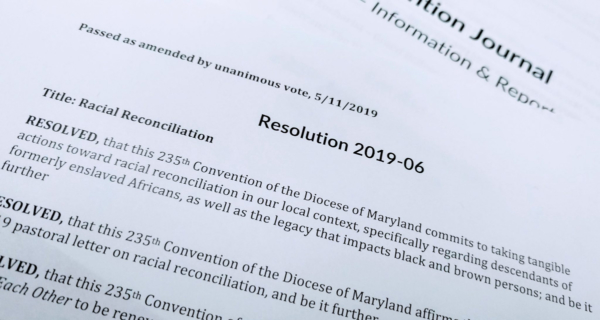Diocese of Maryland resolution on racial reconciliation passes unanimously at 235th diocesan conventionPosted Jun 4, 2019 |

Resolution on racial reconciliation presented to and passed unanimously at the 235th Diocesan Convention of the Episcopal Diocese of Maryland.
On Saturday, May 11, 2019 the Diocese of Maryland made history. After a healthy debate at its annual diocesan convention, Bishop Eugene Taylor Sutton called for a vote on the Resolution on Racial Reconciliation (see full text below). The “All in favor of this resolution” call resulted in a rousing voice vote of “Aye!” Then came the “All opposed…” vote. There was complete silence. Despite a widely anticipated divisive outcome to the issue, the resolution that had in part called for Episcopalians to study and support the concept of reparations had passed unanimously.
For decades, the Diocese of Maryland has been doing its work on racial justice, reconciliation and reparations (see Appendix A in pastoral letter). In the past five years those efforts have picked up speed. 26 parishes committed themselves to a journey that would take them deep into their history, illuminate their present and lead them into a future with a renewed commitment to racial reconciliation. The result was a project called the Trail of Souls.
November 1, 2014 was the 150th anniversary of the repeal of chattel slavery in the state of Maryland, which occurred on November 1, 1864. On that anniversary date, the diocese held a Day of Repentance and Reconciliation, kicking off the pilgrimage portion of Trail of Souls. Three years later, there was a second pilgrimage to churches in Baltimore City. The journey continues with research, storytelling and truth telling and dialogue.
Bishop Sutton, in his May 2019 Pastoral Letter on Racial Reconciliation, has urged all congregations in the Diocese of Maryland to engage in study, exploration and self-examination on the subject of reparations. In addition, the letter proposes solutions for building a community of love through programs that support reparations. The letter, with accompanying appendices, resources and reflection questions, is available below. Workshops will be offered in the fall by the diocesan Truth and Reconciliation Commission. Watch the videos below to learn more about the Diocese of Maryland’s work on reparations and future actions. Below also, is a segment of the letter highlighting current programs and proposing future actions.
“The Sutton Scholars® High School Enrichment Program is a good example of a type of reparations. This program is designed to help inner city youth, particularly black youth. Its aim is to make their high school years a successful venture and to not allow them to fall prey to the many traps that confront them, or to live into the prevailing belief that they are “less than” others in our society. Programs such as this have proven to offer a significant contribution to helping young black youth stay out of the criminal justice system. These kinds of programs are invaluable in helping to repair the brokenness.
Other possibilities are:
■ Improve existing housing assistance programs that help Black Americans move towards purchasing homes.
■ Develop mixed-use housing that helps create communities of various socio-economic groups and not just low-income housing that creates communities that become alienated and labeled.
■ Invest in existing communities by bringing desperately needed services such as grocery stores that are affordable; urgent care centers; community centers for not only youth, but all ages; pharmacies; green spaces/community gardens.
■ Develop and implement meaningful job training programs that are partnered with corporations and local businesses for actual job placement. These programs must also include social services, such as case management and financial literacy programs, to increase opportunities for long-term employment and successful personal money management.
■ Encourage seminaries to have at least a 30% ratio of faculty of color. As well, develop and implement non-traditional paths for ordination for black students who have been denied entry into seminary because of lack of undergraduate degrees but have the capacity for ministry. Finally, offer free or significantly reduced tuition for seminary training.
■ Provide free tuition at community colleges for black Americans and reduced tuition at undergraduate schools and graduate programs.
These are some suggestions and you will have others. Is there a ministry you are passionate about that helps repair the inequalities in our society of the legacy of slavery? Do you work with organizations outside the Church that are doing this work? Do you have ideas for new ministries that would help build the Beloved Community?”

Social Menu